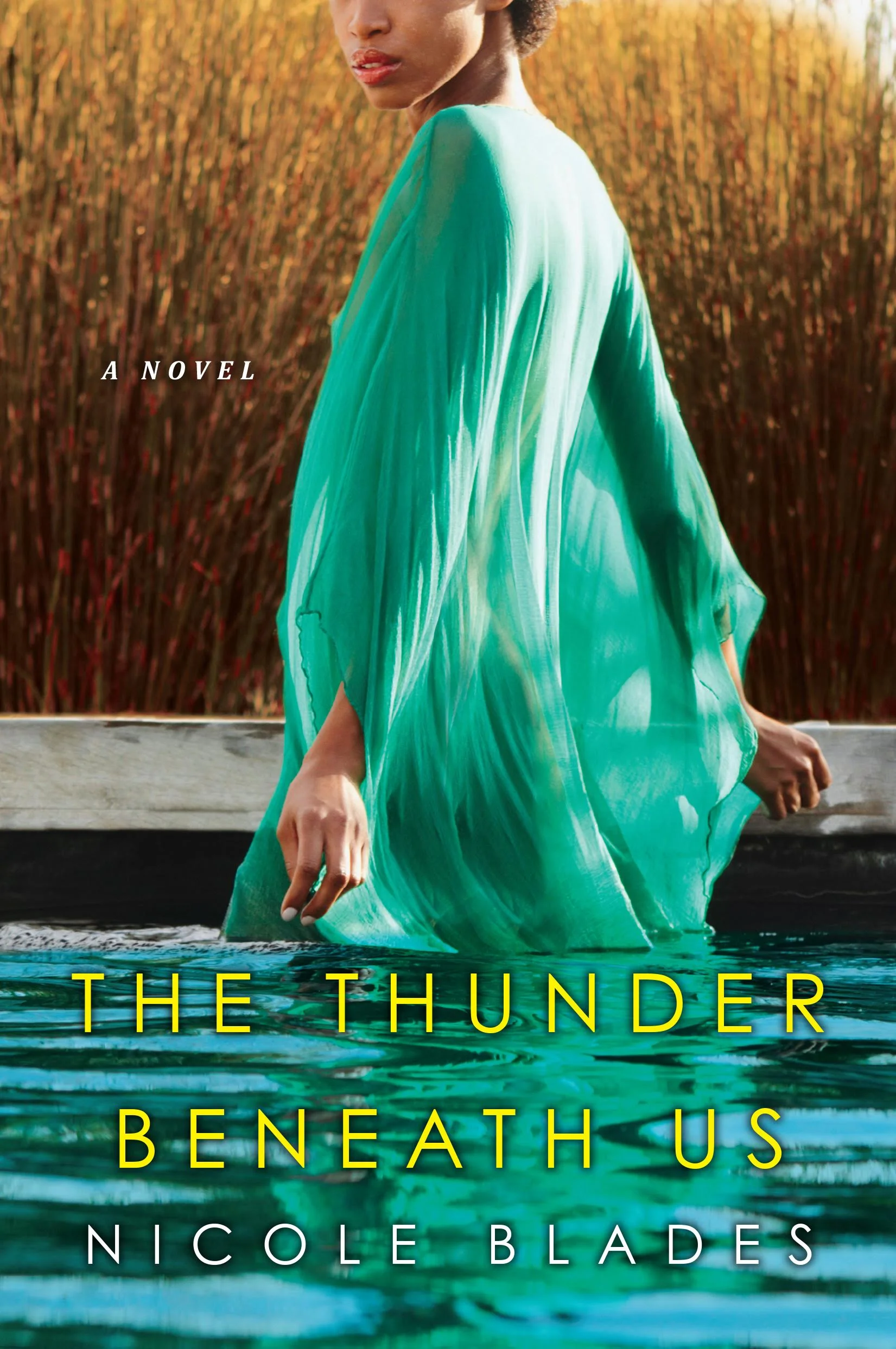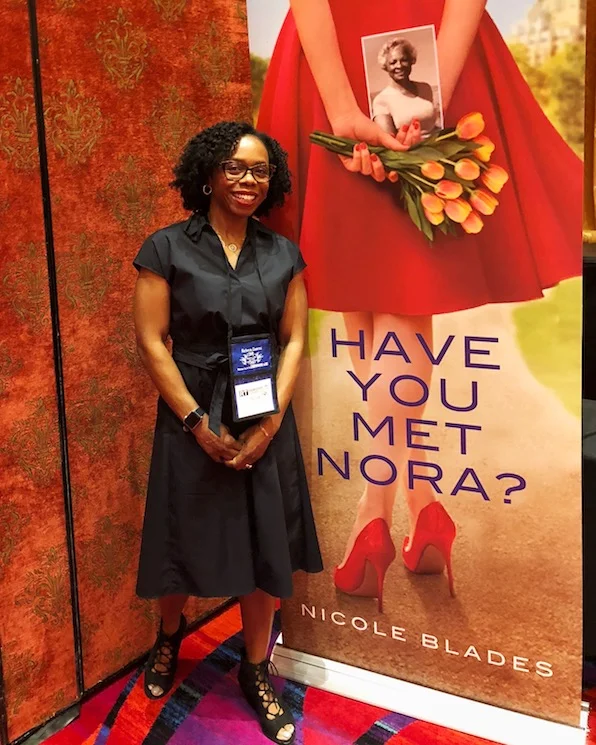Storytelling has always intrigued me. It’s at the core of being a human being. It’s what makes us, us. Through it, we can learn about ourselves, about the world and our place in it.
Nicole Blades is a juggler of time. She is a novelist, speaker and journalist, not to mention being a mother, podcaster and most-recently personal trainer. We talk to her about her top tips for starting a podcast, becoming comfortable with self-promotion and what to do when life gets in the way of your writing.
What made you want to be a writer?
Storytelling has always intrigued me. It’s at the core of being a human being. It’s what makes us, us. Through it, we can learn about ourselves, about the world and our place in it. My father is an excellent storyteller. Even as a kid, I was so captivated by the way my father’s tales about his adventures and life growing up in Barbados would come alive just through his words. To be able to get a glimpse into someone else’s world, see how they make certain choices, good or otherwise, is truly fascinating. It almost makes your heart beat a little faster.
And, as I like to say, I’ve been telling my own stories, putting them down on paper since Mr. Polka’s third-grade class back in Montreal, where I was born and raised. Mr. Polka remains my favorite teacher to this day. Although he didn’t believe in homework — “Your parents don’t take home their work; why should you?” — he did believe in storytelling. Mr. Polka encouraged us kids to write down our stories and to do it every day. But the most important thing he did for this quick and curious, mixed-bag of nine-year-olds was to show sincere interest in what we were writing. He put a lot of stock in our imaginations, which inspired me to believe that what I had to say was interesting and, even, important.
As for how I started writing professionally, that goes back to the about-to-enter-college years and my thinking I should maybe be a lawyer—because I didn’t have the confidence then to say that writing was my vocation. I remember sitting the LSAT in this overly warm, sunny room and midway through it saying (maybe even in a stage whisper!): I don’t want to do this. I left after it was over and didn’t bother checking what my LSAT scores were when they arrived in the mail. I had already decided and moved on to writing for the university’s newspaper, never looking back.
How do you motivate yourself to write?
Motivating myself to write is the easy part. I truly enjoy it—even when it’s not flowing as smoothly as I would like. I just like telling stories and writing them down.
And I do have a writing routine. I can see certain aspects of my fiction writing process that stem from my career as a journalist. How I approach a story is similar to how I would a magazine feature. This means I do a lot of research, ask a lot of questions (a.k.a. get nosy), interview people, and try to understand something from different angles.
When I’m actively writing, I’m very focused on it and much of my writing routine is devoting large chunks of the day to writing and editing and re-writing and continuing working on it. I write even when I’m not writing (as I mentioned before, think-writing). It means I’m always thinking about the story… while I’m out doing other things like errands or driving to an event or eavesdropping on two people at a café (come on, who doesn’t do this?) or acting out dialogue in the shower or just letting my mind float free—I’m always thinking about the story and working it.
Normally, I will block off two- three-hour chunks of the day while my son is at school to work on a manuscript. But even that is changing with my taking a part-time gig as a personal trainer at a local gym in January. Now, I have to squeeze in my writing in small blocks on some days and not beat myself up if I only get 300 words out of it. I remind myself: That’s 300 words that weren’t there before, woman!
You also run a successful podcast, Hey Sis!, aside from your writing. How did this come about and do you have any advice for authors wanting to start their own podcast?
Part of telling good stories is listening to other people’s stories, hearing about their experience in this world. I’m a big fan of the medium and longed to do a podcast of my own for a few years. However, I didn’t want to do it solo. I wanted the show to be a conversation, sharing stories. But it had to be the right chemistry or combination of personalities to host the show I envisioned. I approached a friend about doing it with me, and we were going to talk about life “beyond motherhood.” But then her life got complicated and I shelved the idea. Then I spoke to my younger sister Nailah about it. She lives nearly 3,000 miles away and we talk every day anyway so I thought it would be a good fit. It took us about a year to iron out all the details and get clear about what kind of podcast we wanted it to be.
My advice for anyone thinking about doing a podcast is:
1) Take the time to think through your show idea. Make sure your concept is fresh and solid. If someone were to ask what your pod is, you need to be able to give them a succinct and intriguing answer. Elevator pitch! Although shows evolve and grow over time, the essence of your podcast needs to be clear and meaningful to you. Think: Would I still care about this in five years? Would listeners?
2) Develop a distinct tone/voice for your show. Being natural authentic go a long way.
3) Make sure your production and sound quality are top-shelf. It’s crucial. Poor sound quality or shoddy production can derail you before you’ve even gotten halfway down the tracks. So decide if you’re going to pay someone to produce (edit, mix, etc.) your show or if you go DIY, then buy quality equipment (microphones, editing software) and learn how to use it well.
Is there any particular incident that has happened along your writing journey that you’d like to share?
When I was promoting my second book, The Thunder Beneath Us, I was asked in an interview what took so long for this book to come out (my debut novel was published six years previously). The answer: “Uh, life.” It wasn’t my intention to have so many years fall between my debut novel and my next book. I had been writing and working as a journalist throughout that time but how it ended up that way was the result of a few twists and turns.
It goes like this: I had finished writing a second book eight years ago. After querying agents with this Book No. 2 for a while, there were no bites and it never got picked up, so I started working on Book 3. That third novel became The Thunder Beneath Us. And the second one—the one I thought that had I finished back in 2010—well, that went through many changes and revisions and recasts, but the heart of the story always remained the same, and that book became Have you met Nora?, published November 2017. All tallied, I had been living with and working on that Book 3/Nora for nine years! In between all of that I married, had a kid, moved, moved again, took a contract job as a magazine editor, went freelance, and kept writing.
Do you have any advice for aspiring authors?
I’ve been asked this a few times, and it’s a great question. Part of me is often tempted to say, my advice is don’t listen to other people’s advice! However, I know that I have received some really helpful words of wisdom from other writers on my path. So, I’ve boiled it down to three things: First, read. I know; it feels like there’s not enough time to read, but you must make the time. Writers read and read and read. That’s just how it goes.
Next, write. Writers write. Find a schedule that works with your life—getting up before the sun or blocking off two hours at night after everyone’s gone to bed—and write, and try to do it most days if not a little bit every day. Storytelling is a craft and you have to continue to work on it.
Lastly, find your voice and use that. Don’t bother emulating your favorite writer. That’s their voice. Use yours to tell the stories you want to read.
What do you think is the biggest challenge for new authors?
Being tenacious. In this industry, there are going to be plenty of doors shut in your face and some that never even get opened, but you have to believe in your talent, you have to bet yourself, and above all, you have to stick with it.
What methods of book marketing do you find the most effective?
What works for one writer could be a total bust for another. The main thing is to be ready and willing to do the extra heavy-lifting of promoting your own work. You could be blessed with the best ever publicity team at your publishing house, and you still have to be out there beating your drum. Getting comfortable with self-promotion is a good start.
What struggles did you face in the publishing process?
Right now I’m dealing with the submissions process and the waiting game that goes along with it. Book No. 4 is out with a few publishers, and waiting to hear back from them has my nerves basically ground to dust. Instead of chewing my fingers (not even fingernails!) off, I’ll do the one thing I can do as I wait for word: write. I started on Book 5 a few weeks ago, and I’m very excited about this new story. But my un-chewed fingers are still very much crossed!
How do you handle rejection as a writer?
This is perhaps the worst part of the writing/publishing process. It’s unavoidable, too. At some point in your career as a writer, you will face rejection in some capacity. It’s part of putting your art out into the subjective world. I’m actually doing presentations at upcoming writers’ conferences on how to use rejection to fuel your work instead of your doubts. So, I’m not going to give away all my “tricks” here, but I will say that learning how to turn rejection around to be a valuable tool in helping to focus your work, drill down to the true essence of your vision, and unearth something new and wholly innovative has everything to do with taking the personal out of it and changing your perspective. Mind, even though I am going to be doing talks about handling rejection, I am still very much working at it myself. Hearing “no” will always stink—at first—but how you move forward from that initial sting is what makes all the difference.
How do you deal with isolation, as writing is an inherently private exercise?
I’m all right with the private/alone part of writing. There’s so much going on in my head as I plot and build and create, that it’s better for me to be in my own little world, where I can laugh or sing or take a boogie break as needed. However, I do think that social media has been a gift (and sometimes curse) for us write-alone types. You can hop on Instagram or Twitter and feel plugged into the world, feel like you are part of a fabric that spreads beyond your four walls. And then you can unplug from all of it when the rumpus gets to be too much, and go back to your dreamed-up world on your computer screen. I also have a great group of writer friends with whom I can commiserate via a quick text message, FaceTime chat, or (luckily) a lunch date IRL.
You can find out more about Nicole and her books via her website and social media profiles on Instagram, Twitter and Facebook.













